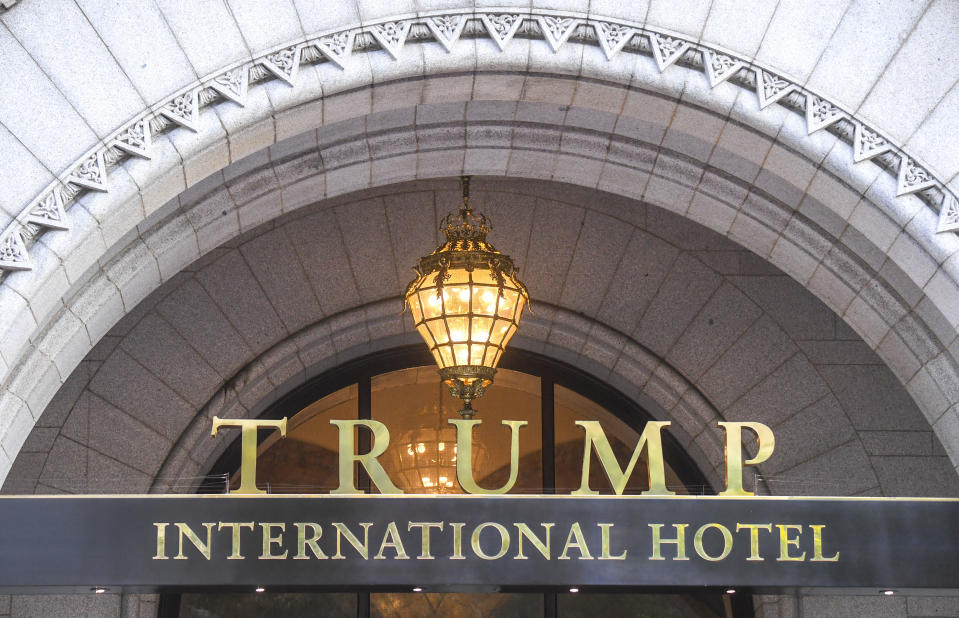Why Trump’s tax returns still matter
You’ve probably tuned out by now. Democrats want to force the publication of President Trump’s tax returns, while Trump resists at every turn. Lawyers are getting rich, while voters learn nothing new.
Yet the Democratic effort to pry loose Trump’s financial information has now made it to the Supreme Court, with a final ruling likely by summer. And the court seems likely to rule that Trump’s banks and accounting firm must release at least some of Trump’s financial information. If there’s a bombshell in the material, we’ll likely know by Election Day in November.
The Supreme Court hearing on May 12 involves subpoenas from two House committees, plus another subpoena from the Manhattan district attorney. The subpoenas aim to obtain a variety of information relating to Trump’s business activities and his personal financial information. The Manhattan DA is also probing hush-money payments to two porn stars Trump allegedly had affairs with. Trump’s former lawyer, Michael Cohen, pled guilty to campaign-finance felonies for his role in those payments, so Trump, who signed the checks, might be liable as well.
All three subpoenas seek information from third-party companies Trump has done business with—the Mazars accounting firm, Deutsche Bank and Capitol One—rather than from Trump himself. That’s why legal experts think Trump’s defense is weak. The Supreme Court ruled against Richard Nixon in 1974 and Bill Clinton in 1997 when they tried to claim the kind of executive privilege Trump is asserting. Because of the coronavirus pandemic, the Supreme Court is hearing the case remotely, with several news organizations live streaming the hearing, allowing anybody to listen in.
If Trump loses, publication of his financial records could rattle his reelection bid, for at least four reasons. First, it’s possible Trump pays a very low tax rate compared with ordinary workers. As a real estate developer, he enjoys tax breaks that can sharply lower tax payments. And investment income, which is how wealthy people earn much of their money, is typically taxed at lower rates than income on labor.
Developer tax breaks
The average American worker pays about 14% of his or her earnings in federal income tax, not counting extra payments like the taxes that fund Social Security and Medicare. Joe Biden paid about 33% of his gross earnings in federal income taxes in 2018. Trump’s rate is probably way lower, and it’s possible he has paid 0 taxes in some years, since he can claim business losses that slash his tax obligation. Most politicians don’t run the kind of business Trump does and don’t benefit from those tax breaks.

It’s easy to demagogue a politician like Trump for being a tax evader, even if Trump uses legal loopholes to lower his tax bill. Unlike the Trump Russia investigation or the Ukraine whistleblower complaint, taxes are intuitive to voters and easy to understand. If Trump, who boasts frequently about his wealth, pays a lower tax rate than typical middle-class workers, he’d be more vulnerable to charges of benefiting from a rigged tax system skewed to benefit the wealthy.
A second risk for Trump is the question of whether he and his family benefited from the Trump tax-cuts, which passed at the end of 2017. The law sharply lowered the tax rate on the type of business the Trump family operates. And it included other provisions that probably benefited Trump. If so, it would bolster arguments that Trump is more interested in self-dealing than boosting workers.
Trump’s returns might also show how much he personally benefits from low interest rates, through, for example, variable-rate loans that reset periodically. Before coronavirus lockdowns forced the Federal Reserve to slash interest rates, Trump hectored the Fed to cut rates, frequently blaming the Fed’s reluctance to cut for a slowing economy. If it turns out Trump makes money when rates fall, it would be more evidence of self-serving policies.
The last risk for Trump is evidence of shady business dealings with counterparties in Russia, Saudi Arabia, or any other country that’s a foreign-policy challenge. Trump has been unusually solicitous toward Russian President Vladimir Putin, for example, prompting speculation about whether he has a private agenda. The Mueller inquiry did not find evidence of collusion between the Trump campaign and Russia during the 2016 election, but it also documented numerous efforts by Trump to stonewall investigators. Why does he act like he has something to hide? Trump has also let Saudi Crown Prince Mohammed bin Salman off the hook for the 2018 murder of journalist Jamal Khashoggi, despite solid evidence of the prince’s involvement. Is there a financial relationship between the two that might explain why?
It’s also possible, of course, that Trump’s tax returns aren’t as damning as critics contend. Yet he acts like they are, defying tradition by being the only major presidential candidate since the 1970s refusing to release his returns. Voters will make up their own minds, if they ever get to see what’s in them.
Editor’s note: This is an updated version of a story originally published on Oct. 7, 2019.
Rick Newman is the author of four books, including “Rebounders: How Winners Pivot from Setback to Success.” Follow him on Twitter: @rickjnewman. Confidential tip line: [email protected]. Encrypted communication available. Click here to get Rick’s stories by email.
Read more:
Get the latest financial and business news from Yahoo Finance
Follow Yahoo Finance on Twitter, Facebook, Instagram, Flipboard, SmartNews, LinkedIn, YouTube, and reddit.
